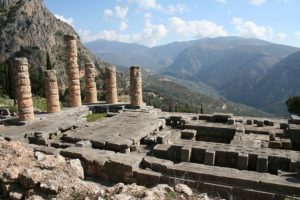I Have Looked upon the Face of Jolliness
The ancient Greeks in poetry were lewd
As limericks, playful, silly as a stand
Up joker on a comic’s platform, rude
And crude, yep, far more rude than Russell Brand.
Emitted from these ancient rhythmic throats
Were poems dealing with the gods, the coarse
Ones, Pan and Dionysus, and hot goats
And Satyrs, all with sex drives like a horse
In festivals of reeling lust and wine.
Iambic or dactylic, lines with jolts,
Trochaic poems aimed at the divine
Ones’ spillings, jouncing hard and up like colts.
..Disrupted rhythms, meters, urgent verse
….Were aimed at wildest holiness—or worse.
If Orpheus Had Not Looked Back
Modern poetry modern verse contemporary poetry contemporary verse modern poem contemporary poem
If Orpheus had not looked round, his wife
Would not have fallen back to death. He would
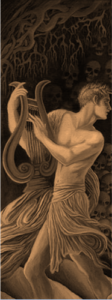
Have had her all his unheroic life.
The Argosy was past. He understood
That. It was likely he would not have gone
Out on another quest with Jason or
His like. Eurydice would see him yawn
With tedium. She would have heard him snore
Instead of singing love and death with lyre
And holy words. She would have made him stew
And porridge by their Thracian hearthside fire.
She would have seen their lust go up the flue.
His voice would have lost its edge, his song
Its passion. Boredom would have come along.
Imperfection as Perfection
Modern poetry modern verse contemporary poetry contemporary verse modern poem contemporary poem

The eyes are white and wide. They look as spare
As Orpheus’s when he lost his wife.
Yet Alexander never knew such bare
And sand-dune meaninglessness in his life.
Perhaps the perfect oval of his face
Veiled slightly by the waves of hair does most
Too cry out flawlessness, a broken case
Completeness. Chin and lower lip are full
To balance out the breadth of features, not
That any element is carved too broad
Or thick. His heaviness is beauty fraught
With calmest force. He aggregates a god.
The broken nose is settled with a brow
Which pulls the eye to swelling like a vow.
Instinct and Alexander the Hateful
Achilles, after many years of war,
And after losing Patroklus to death,
Reacted vilely, more like smelly whore
Than man of Greek-sky principles. Blue death
And anguish overwhelming him like sea
Wave, catastrophic, made by monsters, sent
Submerging him in salt-depth grief so he
Was twisted out of decency and bent
To evil. Alexander had men pierce
The feet of Batis. This was not pure wrath.
This homage to Achilles was too fierce.
Then Batis was dragged in his horses’ path.
..Achilles followed instinct, anger nude,
….But Alexander was just cruelly crude.
Invisible Ivory Music
Heard melodies are sweet, but those unheard are sweeter. ~ John Keats
Herus Pamphilius claimed that Orpheus’s drifting soul, destined to be incarnated anew in some other physical form after he had died, elected to be born a swan so that he would not come out of a woman, loathing all women due to their deadly effect on him. ~ Plato, The Republic, Book 10
When Orpheus discovered that his soul
Must travel, travel, travel to a new
Birth, he preferred to migrate in that bowl
That is a cob’s deep nature. Swirling blue
Of river waters would be well to float
Him through to immortality. If hatched
Of whitest white, his arcing, curving throat
Could sing his longing unheard songs unmatched
In silent beauty. Most of all he wished
To be unborn of woman, thinking breath
That they might give him would be always fished
Up from the dregs of mud-like jealous death.
..He did not want to be a woman’s gift
….Again. He wanted maleness left adrift.
Orpheus and Male Reincarnation
When Orpheus decided that he craved
Escape from women utterly and so
Desired migration of his spirit saved
From birth to any of them and to go
Instead into the beauty of a cob,
The poet did not try to fly away
To some escape from further deaths. To rob
Death of its wrongful right or to dismay
Long universal laws was not the singer’s aim.
We wanted rid of women, that is all.
Repeated deaths are fated. But the shame
He hated was the thought his soul would crawl
Inside a woman’s womb. He feared such sacks
Because of clawed soft hands and their attacks.
Ithaca ( Ἰθάκη), the Dull Town
Your wife is there, your two-balled heir, and hound
Still true (like bone to brawn) behind his eyes
Destroyed with cataracts—but his snout’s bound
To ravel your armpit; he’s the surprise
That isn’t surprising when you return
Among the power suitors, culling coins
That smell like faithlessness. And now you burn
In Ithaca for things you’ve known, myrrhed loins
Of Circe, scent of hot stake driven through
The Cyclop’s eyeball, stench of steaming blood
Outside the walls of Troy, and wine-dark blue
Of seas you’ll never breathe again, all these cud
You’ll have to chew on now that you are in
This royal village. Boredom is its sin.
John Keats
Modern poetry modern verse contemporary poetry contemporary verse modern poem contemporary poem
‘the last lineal descendent of Apollo’ ~ Arthur Hallam
The inmost soul of poetry is Keats.
Its spirit is derived from locks of hair
And curls about his temples. Muse’s seats
……….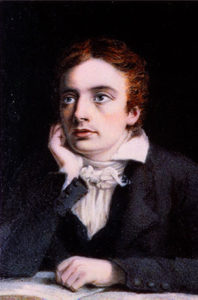
In heaven rock with wonder and despair
When goddesses consider how our loss
Of genius in his chanting throat and lips
Quakes far beyond our measure. Words emboss
The universe because perfection slips
Out in the ether in between the stars
And giant planets from his pen and eyes
Now dead. The lines are metal-clad like Mars
Or golden like Greek prehistoric skies.
..Apollo rises up to take their fire
….And touch it to his son as with a lyre.
Like a Voice from the Cave of Delphi
Modern poetry modern verse contemporary poetry contemporary verse modern poem contemporary poem
“S[ocrates; known as Suqrat in Muslim literature] professes to be dismayed to find that the poets whom he questioned were quite incapable of explaining the meaning of their poetry, and concludes that they compose not wisdom … but by a kind of instinct and inspiration … like seers.”
~ Penelope Murray, Plato on Poetry, 10
…..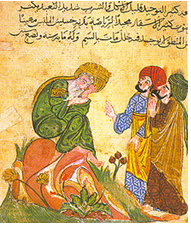
When Suqrat bothered to get serious
About the poets, he began to ask
Them to explain their lines. Imperious
As always Plato took them all to task
Because they could not tell him clearly all
Their poems’ meant. He wanted them to be
Logicians, more like him. His high-class drawl
Undoubtedly removed their clarity.
He felt their ambiguity of thought
Was pitiful. Instead of thinking, “Wait.
Perhaps that is the point,” the thinker ought
To have decided not to castigate
Them for their fuzzy inability,
Much better than his own sterility.
Literary Inspiration from on High
“The gods arranged all this, and sent them their misfortunes in order that future generations might have something to sing about.” ~ King Alcinous in the Odyssey at the end of Book VIII
The question of our poets’ impulse, long
Ago explained by Alcinous, clears
Up all the theory. Great bardic song
And lines came springing up from shield shaped tears
And wounds. Philosophers, esthetic thought,
And modern literary academe,
Spare our minds then, which have been too fraught
With suppositions, fancy and extreme.
Accept the simple truth. The reason that
Great poetry exists is due to gods
Who tortured primal men and made them splat
Against the worst of evils and bad odds.
..If gods had not thus intervened, our hearts
….Would now make do with small pathetic arts.
Lopped and Crippled
Modern poetry modern verse contemporary poetry contemporary verse modern poem contemporary poem
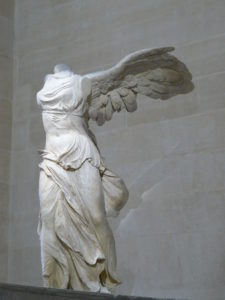
So little full-limbed poetry survives
The ancient Greeks, we’re left to deal with things
Grammarians have saved for us—and lives
Of poets put on plinths though lacking wings.
Biographies are mutely hard to piece
Together, and of course we don’t know if
The details, not destroyed by time, release
Carved truths in dithyrambic lines. A whiff
Of verisimilude wafts past, but
Everything’s less certain than we want.
We want those golden images that jut
Up like flames of truth, not ones that taunt
Us with their spikes of hints and pale-eyed winks.
We want whole works, not a moth-eaten sphinx.
The Primitive Polyphemus
before the Strangers’ Attack
But then again we do not always need
The total poem. Au contraire. We guess
The substance missing. Hurt lines also bleed.
The rips and blots allow us to say yes
To meanings we imagine. Deletions
Free up the mind to search for what lines might
Have sung. Cannon balls fired by Venetians
Destroyed the Parthenon, but now the sight
Of it, its ragged grace, permits the brain
The chance for visions of its marble strength
Unscarred. We close our eyelids. Then we strain
To see its first conception, that full length
Unbroken in its beauty. Hearts can spy
Out perfect splendor, primal to their eye.
Love as Sung by Alexis
“He is not foolish, nor yet is he wise;
But he is made up of all kinds of quality,
And underneath one form bears many natures.”
From the Phaedrus of Alexis,
In Athenaeus, Deipnosophistae
Alexis steps away most carefully
From saying that the god called love is male
Alone. No. He or she is prayerfully
Invoked as every sex combined. The gale
That rushes in our ribcage when love grabs
Our hearts is not a maleness that impales.
It is not femininity that takes
Us deeply in. The open throat assails
Us with its need for poetry and song
And other fevered, flesh-like needy things,
Destroys logic, and imposes long
Fulfillments in us, flying without wings
The way we fly in nightmare scenes above
The ground of life, mouths opened wide for love.
Love that is Love
“Then his folly is
Pure madness, but his wisdom a philosopher’s”
From the Phaedrus of Alexis,
In Athenaeus, Deipnosophistae
A giant book about gastronomy
And wisdom—if such stuff can be combined—
Pretends to touch on the astronomy
Of everything. It tells of men who dined
On wisdom and on alcohol and food.
The dining host and guests fuse male desires.
Along the way they manage to allude
To thinkers calmly dealing with those criers
Respected most, philosophers and those
Who sing of passion. All acknowledge bad
And good finds dovetailed union. They propose
That love is wise and foolish. Love is mad.
..That comes from recipes included in
….Men’s minds with purities of wildest sin.
Masculine Rhythms and Forms
Modern poetry modern verse contemporary poetry contemporary verse modern poem contemporary poem
How formal were the Greeks in ancient verse,
The oldest voices most of all, the blind
One, Homer, and then Hesiod. Disperse
All thoughts of paltry freedom. Do not mind
The strictest beauties of control. Since males
Are almost always in the focus of
This poetry, we must expect the tales
Inside the lines to waive romantic love
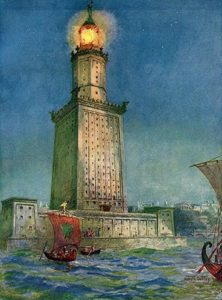
And weaker sentiments. A formal tower
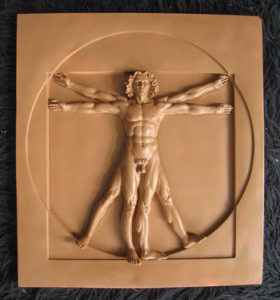
Implies a manly consciousness. The flesh
Of poems like the Iliad has power
Because poetics and the subject mesh.
..Do not desire a flabbiness of free
….Verse there. Expect a stricter liberty.
Metallic Heroes Did not Dare
to Turn their Backs
Modern poetry modern verse contemporary poetry contemporary verse modern poem contemporary poem
Bronze swords, and shields, and helmets with their crests
They wore while slicing men with wounds and death.
The warriors wore bronze breastplates on their chests
To save their lungs from being pierced so breath
Would wheeze with bubbled blood from them. Greek bones
And shins wore greaves in bronze to save the fronts
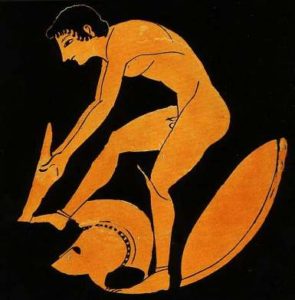
Of legs from havoc. Soldiers loved the groans
Of enemies and sounds of death’s last grunts
In victims. Those were something Greeks could gloat
About once spoils had been taken. In
Their courts much later troubadours could bloat
Greek victories, forging glory out of sin.
The mutilated dead lay on dark fields

Without their looted bronze and gory shields.
Misogyny (μισογυνία) is a Greek Word
Modern poetry modern verse contemporary poetry contemporary verse modern poem contemporary poem
“What would a man not give to engage in conversation with Orpheus?” ~ Plato
That marble minded Plato thinks of men,
Not women, girls, or boys before they grow
Their body hair in armpit, crotch, and then
The beard. His brain was right since women glow
With threat and pain for Orpheus. They tear
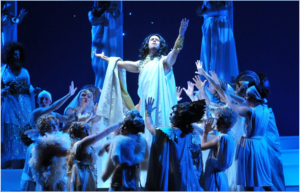
Him into pieces, cannibals of verse,
And song, and sex with beautiful young flare
Of manly parts. His wife was even worse.
Eurydice abandoned him across the Styx
Where lyrics, potency of maleness, harp
And grief are pale. She was his crucifix.
He knew a wife’s and women’s loves are sharp.
..So Plato knew the universe’s laws.
….The singer should seek males, not women’ claws.
Mixed Race Divinity and Humanity
Socrates “builds up a picture of the poet as ‘a light, winged, holy creature’, who cannot compose until he is out of his mind and possessed . . . . The god takes away the poet’s senses, and uses him . . . so that the poems he utters are ‘not human and of men, but divine and of the gods’ ”. ~ Penelope Murray, Plato on Poetry, 8-9
Hyperbole is Plato’s swollen trick
While he pretends that poetry is good.
The ploy almost winning, glistening, slick,
Is glossy till the truth is understood.
He makes the overwhelming of the soul
Of poets by divinity to seem
A glorious invasion. Gods control
The poets’ minds. Divinity, extreme
In ravishment, imposes holy rape
Resulting in an offspring at best mixed
In its identity, a monstrous shape,
Both god and human. Both of them are nixed,
Though. Such miscegenation makes burlesque,
Degrading both, the two strengths turned grotesque.
Murmurs/Purling
[“Lo! I divine through murmurs borne
The subtle thread of voices old”
~ Paul Verlaine, “Je divine, a travers un murmure”
in Romances sans Paroles]
Just broken murmurs come to us from those
First poets Greece produced, more broken than
The amputated, slammed and shattered pose
Of centaur, or a goddess, or a man—
A hoplyte—marble muscles shouting out
Their former beauty like a deaf and dumb
House slave who, captured in a battle rout,
Once dressed in silks, a princess, is a crumb
Of crust beside a royal couch. The lines,
The piecemeal lines grammarians have saved
Of Sappho, are as sharp as knives and tines
Crushed under centuries of rubble. Staved
In, crumpled, nevertheless sharpness glints
From fragments, from supernal parchment hints.
[The prefacial quotation (from a very old-fashioned translation) is from Verlaine’s Romances sans paroles which he wrote while living with Rimbaud in London.]
Music, Poetry and Architecture, All from Mathematics
Modern poetry modern verse contemporary poetry contemporary verse modern poem contemporary poem
The poet Amphion rebuilt the streets
And temples, houses, and the stoa of
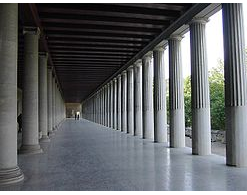
The ruined Cadmeia. His lyric beats
Were more for honing stonework than for love.
His lyre (a gift from Muses or the god
Apollo) Amphion employed for arts
Including architecture. That facade
Of Zeus’s temple and its pillared parts
Arose because of Amphion’s sung verse,
And all the other walls reared up because
Of poetry and melody — diverse
The powers of a perfect poet’s laws.
..His serenading and his lines caused strength
….Of architecture, stretched in columned length.
Myths of Poetry
The early words of poetry arose
From darkness in the depths of throat and lungs
In caves and mixed with burning air. The bows
And arrows in the shadows gave the tongues
That sang the blood and flesh which chanting needs.
Or else out on a plain where wary beasts
Might cringe away from stanzas, words like beads
Made jewels in the night beside the feasts
On kills. Or else a priestess riddled out
A destiny that chilled the flesh and veins
About a man killed by his son, about
That son who makes the marriage stains
In bed with that man’s wife, or more the spell
A poet prays to fetch his love from hell.
Nietzsche vs. Plato
Modern poetry modern verse contemporary poetry contemporary verse modern poem contemporary poem
Nietzsche said that Plato was “the greatest enemy of art Europe has yet produced.”
This Plato spoke in imagery so far
Removed from Heidegger that Plato seems
An artist and a poet. How bizarre
This glows is true to us as cordial beams
Of perfect light admitted to a cave,

Like pretty Mozart music played in crass
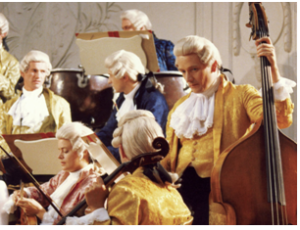
Despair might resonate in shadows, stave
Off blackness, and relieve from Philip Glass.
Just being here is not enough for some,
Like Plato. Poets capturing the truth
Of all that is most lovely overcome
Our senses like a perfect body’s youth.
..That imagery is what Platonic thought
….Most hates. It loathes mere being. It loves Ought.
No Room for Unholiness not Cleansed
“ ‘What would a man not give,’declares Plato in the Apology,
‘to engage in conversation with Orpheus and Musaeus and
Hesiod and Homer?’ Can we do something of the sort? If not
to engage in conversation, then at least to glimpse them as they
go about their holy and unholy business?’ ”
~ Michael Schmidt, The First Poets, 21
We watch them singing in the darkness, hear
The notes and words, in darkness and in light,
And sometimes in the smell of lamps, strings clear,
Plucked, sunlight as the background sometimes, spite
Of love and war and murder by the fire,
The phrases of the ancients find their place
In us who need them, those who seek desire
Of holiness. The poets interlace
The tongue and string vibrations. Open voice
And strangest intervals of lyres wipe out
Unholiness since even sins rejoice
In music that is truth. We feel devout.
..We do not want these poets to be seen
….In gutters. We want poems fiery clean.
Not for Conquering to Crush and Make a Cruel Empire but for Unforgotten Beauty
“Hystaspes had a younger brother whose name was Zariadres: and they were both men of great personal beauty” ~ Athenaeus, Deipnosophistae, XIII, 919
So what if you exist in words alone
In some freak journal from the ancient past,
A pampered book that almost makes us groan
With pedantry gone mad, deep in the vast
Egyptian desert? What if that is all
Remaining of a man two thousand years
Now lost except for those few lines, a crawl
Of syllables across a scroll? Your fears—
Oblivion, blank annihilation,
An emptiness so full that you might not
Have ever been, an evaporation
So total that you might have been just naught—
Are dead, for still you are what most can’t be,
Embalmed with lovely masculinity.
Only the Poet Triumphed
Modern poetry modern verse contemporary poetry contemporary verse modern poem contemporary poem
The only man to live the storm through on
The wind-wrecked ship was singing all the while.
The singer, he survived it in the dawn.
Alone he lived. Alone he missed the isle
Of death. The helmsman and the sailors died.
The night and winds and sea consumed those, all,
So only he remained. With words his guide,
His words with music, he strong-armed the sprawl
And found himself upon a rocky ledge.
He spread his chiton and his cloak then in
The early morning sun, there on the edge
Of life and death. The singer raised his chin
To sing again, a psalm of praise as plain

As whitest cloth. It helped to calm his pain.
Open
The ancient Greeks believed that light beams flowed
Both into eyes and out of them. If stars
Poured in their lights, then stars in light streams flowed
Back out. If Venus, Jupiter, or Mars
Fell down through irises, then planets’ lights
Shone outward, too. When constellations poured
Their glories down, then galaxies sent flights
Of splendor from men’s eyes. Perfections soared
From eyes and lifted hearts like greedy Zeus
Gripped Ganymede to haul him to a cloud
Of lust. What suns put in, the eyes could loose
From pupils, shafts of light with love endowed.
..When Sappho begged a gorgeous man, “Look straight,”
….She wanted shafts to make her core dilate.
Pindar on Theoxenus
The poet Pindar focuses on love
Derived from burning rays from flashing eyes
Of young Theoxenus. They are above
All others. Love in any other guise
Is dimness at its best. The sun can melt
The wax of bees, can sting it with its heat.
When passion of another kind is felt
Like lust for bolder women then, though sweet,
It’s paltry when compared to the desire
This boy’s looks alone can generate.
The lines suggest that men not set on fire
By him love only money or love hate.
Some man might harbor a very hard heart
But most would grow . . . another hardened part.
“One must pluck loves, my heart, in due season and at the proper age.
Ah! But any man who catches with his glance
The bright rays flashing from Theoxenus’s eyes
And is not tossed on the waves of desire,
Has a black heart of adamant or iron [End Page 255]
Forged in a cold flame, and dishonored by Aphrodite of the arching brow
Either toils compulsively for money
Or, as a slave, is towed down a path utterly cold
By a woman’s boldness.But I, by the will of the Love Goddess, melt
Like the wax of holy bees stung by the sun’s heat,
Whenever I look upon the fresh-limbed youth of boys.
And surely even on the isle of Tenedos
Seduction and Grace dwell
In the son of Hagesilas
Pindar fr. 123 S.-M.”
Oracular, or Delphi at its Worst*
In Homer’s time no word existed for
Art. Praxitiles and Sappho had no term
For it. The Greeks had not even the spore
Of such a word, so Plato spoke no firm
Ideals about that thing which we call art.
He had too much, perhaps, to say about
The worth of poetry. It hit the heart
Too truly for his liking, made him pout
That it was not as clear as thinking in
Philosophy, and made him fearful of
Its purpose and effects—far too like skin.
Some lines might sing like snake tongues touching love.
..Verse might be beautiful as wine dark eyes
….Or toxic in appeal to those not wise.
* “The Greeks had no word to denote those activities that we now subsume under the term ‘art’.” ~ Penelope Murray, Plato on Poetry, p. 1
Orpheus Died Several Times
and Could not Save Himself
Modern poetry modern verse contemporary poetry contemporary verse modern poem contemporary poem
Intent is feeble like a hyacinth
In rocks along a mountain path where feet
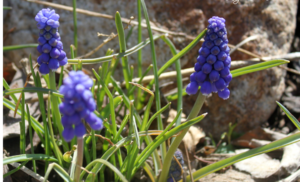
Can crush. Intent is not a marble plinth
Upholding steadfast Zeus. Intention, neat
As it might be, is not the same as gain.
Philosophy is purer than the blooms
But does not guarantee that present pain
Will be replaced with calm. Unnoticed dooms
Are hovering. The myths we tell our hearts
Are only tales. They seem to offer truths
And even some salvation. All their arts
And beauties we pass on to girls and youths,
But myths are only literature. They save
Themselves, retold, but we go to the grave.
Orpheus like One Crucified
Modern poetry modern verse contemporary poetry contemporary verse modern poem contemporary poem
His music tamed a god and tamed the world
Except for human hatreds. Fiercest birds

Orpheus by Astrid Zydower
Rose up to beauty’s calmer heights. Love swirled
Around the poet’s music and his words
And animals around his shouldered arms
To find there curled up peace. The King of Hell
Was moved to tears and tried to halt the harms
Of death to bride and groom. To feel the swell
Of Orpheus in song was like the beat
Of pulses from on high, from moon and star,
From heroes and the goddesses, a suite
Of constellations sending from afar.
..The Greeks knew passions fiercer than a man,
….A spite that stretched a wide and unplumbed span.
Orpheus, Once Torn Limb from Sturdy Limb
Modern poetry modern verse contemporary poetry contemporary verse modern poem contemporary poem
……….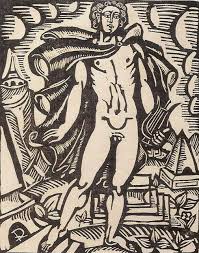
Orphée by Raoul Dufy
Long after he was born, and lived, and died,
The first of poets lives and lives. Before
The rape of art by Modernism tried
To kill off commonsense, an artist bore
Down on a piece of wood to make this strong
Depiction of the poet’s presence still
In culture, much around us. During long
Millennia he holds a lyre. Until
Our kind are dead, more dead than he has been
For many centuries, Orpheus will shine.
In this depiction even each bold shin
And calf shows he himself is still the shrine
For verse and emblematic for all art.
In death he is the living set apart.
Orpheus Sings
“he sings to distract his shipmates from the irresistible lure of the Sirens onto the rocks”
~ Michael Schmidt, The First Poets, 32
The Sirens were a favorite myth, a bit
Like Amazons, their queen and all of that.
Bronze ancient men feared females who had grit
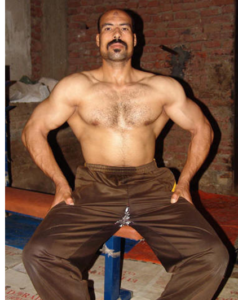
That killed inside their voices with a splat
Of beauty that was fatal. Hatred, fear,
And pregnant loathing are why men cut off
Those warrior breasts in stories. That veneer
Of male respect is something which we scoff
At now. We have our modern shrinks, Germaine,
And other super feminists to tell
With sneers how men have always felt a pain
When women such as Circe cast their spell.
..Men’s threatened machoness needs him to sing.
….It wants Hippolyta raped by a king.
The next two sonnets may offend some readers. If you think you may be offended, please do not read them.
Painless Pleasure: Two contradictory versions of the myth of Ganymede
“to be very eager in the pursuit of pleasure is to go hunting for pain…. Homer…says that the greatest gods receive no advantage from their power, but are even much injured by it, if they will allow themselves to be hurried away by the pursuit of pleasure.” ~ Athenaeus of Naucratis, Deipnosophistae, BOOK X11, 819
When Zeus had girls to love, he had his love
With them and that was it. He left them raped
And he was satisfied. Somewhere above
Him, up on Olympus, nothing escaped
The vitriolic green, that green, green eye
Of Hera and she tried as hard as she
Could strain to cause him misery. Defy
He did. So much for Zeus’s misery.
But when he wooed a perfect, perfect boy,
The wifey didn’t really seem care.
She let him have unhindered his hot toy.
She didn’t really seem to mind this pair.
Please notice, Athenaeus. . . Never mind girls.
The moral: fall in love with boy curls.
When Zeus had girls to love, he had his love
With them and that was it. He left them raped
And he was satisfied. Somewhere above
Him, up on Olympus, nothing escaped
The vitriolic green, that green, green eye
Of Hera and she tried as hard as she
Could strain to cause him misery. Defy
He did. So much for Zeus’s misery.
But when he wooed a perfect, perfect boy,
The wifey in her rage went hotly spare.
She hated Ganymede her husband’s toy,
Destroyed Idean parts in her despair.
Please notice, Athenaeus. . . Never mind girls.
The moral: fall in love with boy curls.
Philopoiêtai, Poetry Lovers from Time Immemorial
“Plato’s Symposium shows how Plato deploys dramatic irony to undermine the philopoiêtai’s use of poetry. Elizabeth Belfiore (“Poets and the Symposium”) argues that the dialogue’s first five symposiasts, in their poetic citations, reveal their failure to think about anything other than the charm of their context-shorn quotations.” ~ http://ndpr.nd.edu/news/plato-and-the-poets/
Just what is wrong with charm? And why not love
The poetry that charms with sweetness, light,
And fragrance like gardenias? Must verse shove
A darkness and a weight on readers, blight
Their joys, or make them think so deeply that
They find themselves in midnight and distress?
We have the horror genres with their splat
Of gore and blood, and Hollywood’s black mess
Of crime and lust and death. Why shouldn’t we
Have fun just reading beauty that beguiles
Us for a moment? Why shouldn’t we be
Free to wink through happiness and smiles?
..Philosophers may favor sackcloth verse,
….But nothing’s wrong with charm. There is far worse.
Piéria
Modern poetry modern verse contemporary poetry contemporary verse modern poem contemporary poem
“the Muses’ ancient home between the roots of Olympus and the sea;
to where
‘Pēneus rolls his fountains
Against the morning star’.” ~ F. L. Lucas, Greek Poetry, xxvii
From very roots our poetry and arts
Grow up and outward, widely, like an oak
Or like computer matrices with hearts.
No gods or geeks are needed to provoke
Our poems, paintings, novels, music’s phrase,
Our rangpur poems, bitter, tart and sweet,
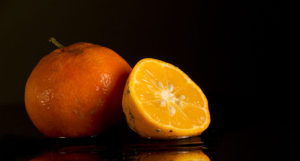
…….https://commons.wikimedia.org/wiki/File:Citrus_x_limonia_(2).jpg
Symphonic paintings swirled with piquant glaze,
Or novel’s sweep refusing to retreat
From truth, or music like a dragon’s fire
That flames from reptile lips and scaly fangs.
We do not need the muses to inspire.
We aim for coronary heaving pangs.
..Who needs the nymphs of rivers or a star
….When artists aim for tidal wave and scar?
Pigs Would Fly if Their Sties Were Noble
Poor Socrates. He thought that if the young
Were wrapped in images of beauty, they
Would take good in and then could climb each rung
Of rightness. Lovelinesses would convey
Them up and straight to healthiness of soul.
Their hearts would be hygienic as the folk
Who live in wholesome climes and who can stroll
Through lovely breezes that he thought evoke
A sturdy righteousness. So, poets who
Are wise will stick to showing only good
And beauty. These are guidelines that he drew.
This is what that simpleton understood.
He did not seem to know that kids want sly
Pigheadednesss, not beauty that floats high.
Plato and Powerful Enigmas
When best, it hums ambiguous like tunes
From dead angels, or more like rubbed out lines
On palimpsests, or like the muffled runes
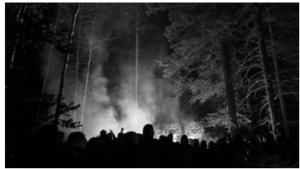
From mouths of ancient Druid priests, like signs
On pharaonic walls and tombs before
The hieroglyphs were fathomed in their dark
Existence. We are walked through rooms in poor
Light. Sentimentality mixed with stark
Dismissal, dovetailed with a piety
Of dubious extremes and the ideal
Swirled all together. No sobriety
Is needed. Readers only want to feel.
..It hums like colors in an LSD
….Confusion. That is perfect poetry.
The next sonnet may offend some readers. If you think you may be offended, please do not read it.
Plato Hated Poetry, Poor Thing
First Sappho catalogued the symptoms of
Tsunami wave emotions. Sickness like
This malady has been treated as love
By writers ever since. It is a spike
Right through the thorax, never mind a prong
From Cupid, and a conflagration through
Our arteries and guts. It isn’t wrong
To say that Plato was a failure who
Tried stupidly to dress it up as souls
Transported to the realms of spirit highs
Above mere lust, above the fevered poles
Desiring gals, and guys’ cocks gouging guys.
Which one was truer, Plato’s more abstract
Ideal, or Sappho on the fuckin’ act?
Poetry and Hateful Plato
Modern poetry modern verse contemporary poetry contemporary verse modern poem contemporary poem
Alone among male populations of
The ancient world (and modern) Plato held
The poet Orpheus in hatred. Love
Of poets and of music had not swelled
In Plato, ever. Orpheus was charged
With cowardice and being just a harp
Player. The accusations were enlarged
Then. Plato said the poet was a sharp
Contriver wanting only to venture
Into Hades for the thrill. “Harper,” just,
No more, the gods despised him. The clencher?
He failed. She fell back into less than dust.
The poet got what he deserved, attacked
And killed by merest women. He got whacked.
……….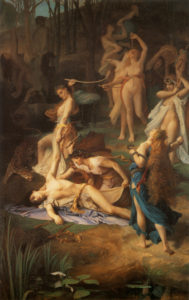
http://the-toast.net/2015/01/26/gleeful-mobs-women-murdering-men-western-art-history/
Poetry, Crime, and Government
“Poets are the legislators of the world.” ~ Shelley
The ancient Greeks still live. They are not dead.
Their poetry from then speaks still upon
Some pages on our shelves. The scholar’s head
Refuses to let go that singing dawn.
These poets are the Russian vory of
The world of literature. They infiltrate
And take control of those in charge above.
These stooges do not realize the weight
Of ancient minds that drives them even now
Or else there is a symbiosis made
Of power when crime and politics each vow
In thinking handed down. Poets pervade
Our western leaders. At some far remove
The ancient words are used to force and prove.
Poetry Makes a Different Exploration of the Realm of Death
No poet thinks about the path the wife
Of Orpheus took down to Hades. Not
One poet ever writes about how harshly rife
That journey was. The poisoned bride’s death lot
Was just the same as anyone’s. The path
The poet took to fetch her, though, was filled
With horrors overcome. He stilled the wrath
Of Cerberus with singing. Three heads thrilled
And tilted to it and he almost whined
With pity. Spinning stopped and fiery pain
For Ixion paused. Furies’ cheeks were brined:
Eumenides felt sentimental stain.
..The doom of one adored was then paroled.
….The lava heart of Pluto turned to gold.
Poets as Healers
The first great poet, Orpheus, was called
The Healer. Is there some great truth involved
In that? Surely Plato wasn’t enthralled
With poets. Plato sneered. He was resolved
To say that they were more inclined to ill
And that they couldn’t even explain their
Craft (seeming to require them to fulfil
The roles of wise academics aware
Of all the dithyrambs and rests) as if
The poets thought mechanically.
Instead their medicine produced a whiff
Of deity and myrrh volcanically.
..The sage one wanted Orpheus to chant
….With wisdom like professors in their cant.
Poets, Poetry, and Women
For well thou know’st to my dear doting heart
Thou art the fairest and most precious jewel.
Yet, in good faith, some say that thee behold,
Thy face hath not the power to make love groan ~ Sonnet 131
Who thinks of blank Eurydice? None. Slack
Her hair may well have been. It seems we do
Not know her coloration. This great lack
Is emblematic. If her eyes were blue,
Or black, or green, or brown, no one has thought
About them. If her hair was curled, or straight,
Or wavy, we know nothing of it. Naught
Is known except she was the wife, the bait
To lure the poet into hell. He went
To find her to recover her and so
We guess that she was lovely. Love is meant
To leap from beauty. This might make him go
To Hades, but then men are known to fall
For even ugly women, graceful as a scrawl.
Ruined Myth and Heavy Reality
Modern poetry modern verse contemporary poetry contemporary verse modern poem contemporary poem
The pillars look more like some backbones stripped
Of skin and muscle than Apollo’s space
In Delphi and are squat and stodgy, chipped
And scarred by ruthless time. They have less grace
Than ragged mountains in the background. They
At least look normal in their slopes and curves
Though battered also. Ruined slabs convey
To tourists almost nothing. Missing nerves
Of ancient prophecy are not supplied
To people wearing sunscreen, Nike shoes,
https://www.nationalgalleries.org/art-and-artists/297/tourists
And Raybans. No one steps up as a guide
For life to offer prayers and dreams to choose.
The stones are worse than ghosts since stones are real.
Bashed columns cannot tell us what to feel.
Sappho Wrote about Twelve Thousand Lines of Poetry
Twelve thousands lines of poetry were torched
By time and Christians. Piety increased
The ravages, all this because she scorched
With love for girls. Bishops made a feast
Of male disgust that Sappho caused by fire
In veins for younger women. Holy men
Destroyed her verses making them a pyre
Of beauty and destruction, one. Her pen
Outdid there sanctimony. No one knows
Who all the Christians were. They disappeared
In something less than dust. Their sacred prose
Has been erased, clean as a shaved off beard.
..The few, those flaming stanzas that survive,
….Have kept her and her singing love alive.
Scholarly Blindness
“Since before 450 BC there was no prose literature,
our only windows on the ancient world are the poems.”
~ Michael Schmidt, The First Poets, 8
It only goes to show that scholars love
To focus narrowly. He looked so hard
At Greeks that he is far too far above
The evidence. In Homer’s own backyard
The Hebrews started writing prose so long
Before the Grecian poems, now we must
Surmise how distant all that was. The song
Of Greece was shiny new when desert dust
Had settled on the scroll of Job. The books
We call the Pentateuch are full of prose
And stories not in verse. So if he looks
Across the sea, he’ll know where stories rose
Outside of poetry, at least the ones
Near Attica. He’s missed out Jacob’s sons.
Scorn
Modern poetry modern verse contemporary poetry contemporary verse modern poem contemporary poem
“Enargeîs is the technical term ‘for divine epiphany:
a word that contains the dazzle of “white,” argós, which
comes to designate a pure, unquestionable “conspicuous-ness” ’ ”.
~ Michael Schmidt, The First Poets, 19
I wonder if perhaps we moderns know
This brilliant whiteness much more clearly than
The ancients did. They made their temples glow
With painted color like the rainbow span
…..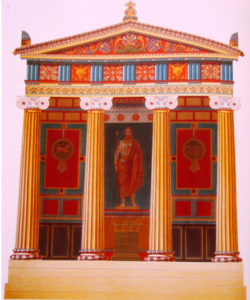
But more intense. The goddess and the god
Were daubed with firmest tints of red and gold,
Blues, reds, greens—strong as emeralds. How odd
That seems to us when what we know is bold
Severest white divinities and stone
Carved columns. Noontime light in Greece
Reveals the purest color for a throne,
A god’s own seat that might hold Jason’s fleece.
..Before the gods became poetic wares,
….Divinities appeared as white-hot glares.
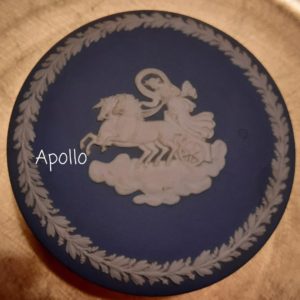
Personalized Epiphany
“This ‘conspicuousness’, he adds ‘will later be inhabited
by poetry, thus becoming perhaps the characteristic that
distinguishes poetry from every other form.’”
~ Michael Schmidt, The First Poets, 19
Deep poetry does something depths can not
Do. It stands out among the arts, a thing
Conspicuous in power. Music, hot
With inspiration, has a different wing
Which rises in the air and heart, but lines
Of Mariana trench profoundness work
Inside the heart, inside its fathom brines
And currents. Down in that divinest murk
Are frigid swelters only words can tell.
The plastic arts appeal to eye alone,
Or sometimes hand, but do not cast the spell
Veins need. Paints do not travel in the bone.
..The theatre and film demand too much
….Control. A poem grants the reader’s touch.
Where? Where? Where?
“Achieved poetry paints with at least one colour
which can be found nowhere else.”
~ Michael Schmidt, The First Poets, 19
Do you know just what that color is? Gods’
Eyes must contain it—goddesses’ more so—
Yet can we see it there? Perhaps it nods
At us with holy winks above the slow
Convictions of a palm tree’s fronds before
The sacrifice by priests in island shades.
Perhaps it gives us glimpses from the floor
Of marble temples. Mostly it evades
Us. That is why it matters. Those who grasp
The color, artisans with words, do not
Themselves know what it is. Fists barely clasp
It in their lines. The hue hates being caught.
..Once found it fades. It must be caught again.
….The rainbow trout gasps out in air-filled pain.
Treatments in English Lessons
Yet even poetry is now without
Transcendence. No one wants to read it. No
One pays for it and no one is devout
About it as they were before the glow
Of cinema and television screens.
Forget about the God is dead debate.
Forget about the notion that machines
Could write it and computers might dictate
It. It is now long dead for most except
For weddings, funerals, engagement showers
And such. No man or woman now is swept
Away to love by sonnets. They have lost their powers.
..The poem’s stored in classrooms only. Still
….It’s there—given like a cultural pill.
Stunned, Stung with Aesthetic Tears
“When it reaches Alexandria, poetry comes in out of the sun,
retires to the library . . . And so it [poetry] survives in a world
where the vulgar tongue is not Greek.”
~ Michael Schmidt, The First Poets, 19
At Florida Technological U
One afternoon I had some time to kill,
Or I was bored with working my way through
Some Library Science. Needing health’s pill
I headed for the shelves of poems doomed
To be unopened in the stacks and took
Anthologized poems down. Wonder loomed.
I read an ode by Keats. The cosmos shook.
My eyes sang out with tears and not because
Of sentiment inside those lines. The tears
Burned down my cheeks because of beauty’s laws.
The ode was like the music of the spheres.
..Perfection in the crafting of each line,
….And not words’ meanings, formed that white stone shrine.
Sing in Me, Rational Muse!
Plato’s “descriptions of poetic inspiration occur over a
long period of time, ranging from his earliest works to
his latest, and there is considerable uniformity in what
he says. Throughout P.’s work the mental state of the
inspired poet is described in similar terms: the poet,
when composing, is in a frenzy and out of his mind; he
creates by divine dispensation, but not with knowledge.”
~ Penelope Murray, Plato on Poetry, 7
Let’s dispense with all this inspiration
Guff. Firstly, no one thinks like that now. More
Than Plato, we employ cogitation
And do not need divine afflatus. Soar
With visions from on high? I don’t think so.
Instead a line or image comes to mind,
Or one idea. That’s enough. Words flow.
And ,secondly, while reading you may find
Your “Muse” in something there—an expression
Or thought that causes something to explode
Inside your brain—like an intercession
From gods, but this in a rational mode.
..You don’t need “Inspiration” to extol
….It, Keats. Just grab the hint—then let it roll.
Some Myths are Far More Real
“Orpheus is a hero, not a god, and a hero more valuable than
most gods, just as Prometheus was.”
~ Michael Schmidt, The First Poets, 21
The gods are less than Orpheus of Thrace.
Gods loomed up large but they were never real.
Majestic for a while, they left no trace,
No godly trace, once Christ’s and Allah’s peal
Rang out. And what was left? Some poems, plays
And myths, poetic in their power these tales
But only words. The new Gods live in blaze
Of certainty and they are males,
Males only, not confused with female stuff.
They crushed the competition on the shores
Of Middle Sea. The new gods brightly snuff
Out lightning bolts, making goddesses whores.
..Yet Orpheus’s shattering still lives
….Across the world. Orpheus still gives.
Sovereignty
Modern poetry modern verse contemporary poetry contemporary verse modern poem contemporary poem
“Is it simply that people who philosophize think that people who produce, consume, or appreciate poetry (the philopoiêtai) have the wrong priorities, and the proponents of poetry think the same of the philosophers?” ~ http://ndpr.nd.edu/news/plato-and-the-poets/
We hold up ancient Greece as sovereign thought’s
Stone citadel, a marble temple made
Of sun struck pillars bright with megawatts
Of power and think that Greek heads banished shade
(Like poetry, emotion, shame) from pure
Philosophy. The mind of Plato shunned
The poets, exiled them, proposed to cure
His Parthenon with cleanliness. He stunned
His listeners by ostracizing plays,
Sharp strophes, epics and silk lyrics from
His architraved Republic. They caused maze
And disarray. They created a slum.
Pretending men could cast out feelings forms
A fool of Plato and his front-brained norms.

Spells and the Thoughts of Tiresias
“Halliwell’s basic argument is that Socrates admits the Book X arguments to be insecure and open to defeat. He calls them ‘spells’ rather than philosophical knowledge, and he asserts that he must use them [those arguments] constantly, rather than deploying them once and for all. Socrates is committed to philosophical ideals, but does not have the full immunity granted by the ‘transcendent knowledge of the good.’ Socrates seeks not to become deaf to poetry but ‘to find an ethical justification for continuing to have [the] experience [of poetic enchantment].’ In this way Plato shows that the model life, Socrates’, seeks to welcome both philosophy and poetry, all the while recognizing the intense difficulty in doing so.” ~ http://ndpr.nd.edu/news/plato-and-the-poets/
When inspiration comes, it is God’s spell.
It casts a spell divinity implants
Inside a soul. When it begins to swell,
A voice in poem and in music pants
Its way to life through throat, and mouth, and lips.
It is the sort of miracle that shakes
Philosophers and moves unwilling hips
To rhythms, rhymes and rhythms like black snakes
In mating, writhing, hissing in their lust,
Their lust transcendent in their need to know
The meaning of the gods who made them, thrust,
And freed them on the stones and made them glow
With mystery of desire that justifies
Existence of an art for gasping thighs.
Socrates versus Sappho
One wonders if poor Socrates might just
Have been much happier if he had made
Up poems, not philosophy. A gust
Of inspiration from Apollo swayed
The poets into rhapsody of thrill.
While lost in love for some young person’s hair,
The writers in their songs spewed joy. The spill
Of this in Sappho then became a snare,
When Phaon or a woman far beyond
Mere beauty left her unfulfilled, gave verse
That rings immortal to this day. The fond
Loves last forever though they were a curse
Like Alcibiades. The thinker’s heights
Should turn to Aphrodite’s lyric nights.
To see Sappho’s fragmentary poem go to https://en.wikipedia.org/wiki/Sappho_31
Stabbing in the Cave-like Dark before There Were Laboratories or Electron Microscopes, Plato Presumed that There Are Souls and that They Grow. How Very Poetic.
“Halliwell claims that Socrates’ remarks about poetry early and late in the Republic differ because the earlier remarks, told during the construction of the ideal state, are oriented toward poetry in education and soul formation, while the latter, told after the state has been constructed, are oriented toward the committed ‘philosophical’ poetry-lover.” ~ http://ndpr.nd.edu/news/plato-and-the-poets/
Who knew that souls are formed as time goes on?
Can that be proved? Can the existence of
The soul be proved? Philosophers can’t con
Us with their thinking if it is above
Plain proof. Where is the evidence of souls
Beneath a microscope’s deep lens? What tool
Can measure souls? Can labs impose controls
To test, and test, and test again? What fool
Besides a Socrates or Plato would
Assume the soul’s existence if there’s no
Hard evidence, empirical, they could
Adduce? And how can any of us know
Their claims are true and check if souls can morph
At all? Such thought’s malformed, too like a dwarf.
Stretching the Eternal
Modern poetry modern verse contemporary poetry contemporary verse modern poem contemporary poem
“the soul’s survival and residual divinity” ~ Michael Schmidt, The First Poets, 23
The followers of Orpheus, if not
The man himself, desired a lengthening
Of all they thought was mortal, what they thought
Could be like deities, the strengthening
Of what is god-like in humanity.
His music in itself might be the strong
Force for controlling the insanity
Of crazed rites in wine-drunk groves. When the song
Had lyrics added, it might free up souls
Entrapped in lusting only—and make clear
The spirits’ needs. Apollo’s cool controls,
All gold, inspire chorales from longing’s sphere.
Because of him the whitest silent swans

Might learn to sing in everlasting dawns.
That Supreme Nazi, Plato, Sounded Off about Orpheus
Modern poetry modern verse contemporary poetry contemporary verse modern poem contemporary poem
He takes the poison of his courage and
His love. He does not try to dazzle death
With poetry: Romeo is not bland
Like that. He gulps down. He breathes his last breath
For love made up of colors of the fire
Flame swallowers devour. He just kills
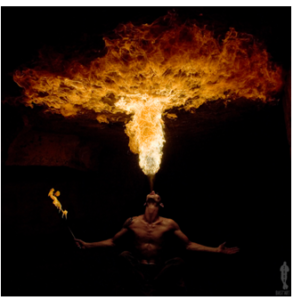
Himself. Yet Orpheus did not desire
That heroism. He offered Pluto thrills
To charm Eurydice past Hades’ clasp
But did not offer up his harping life.
The poet did not leap into the grasp
Of hell to save his ravishment stained wife.
..The god of Hades loved his wife too much
….To give the coward back his wife to touch.
The Big Exceptions
The women move in caged in places both
In life and plays. In poetry they are
Curtailed to Sappho and Corinna. Troth
Constricts Penelope. It hems. No spar
To take her seas away, she sits at loom,
Is trapped at night unpicking her trapped work,
And knows a palace room is just a room.
When husband is away she cannot shirk,
Not even then. Medea knows this worst
Of all, this girdle of confinement. She
Is left behind with children, then the burst
With hatred’s poison. Only then she’s free.
..The goddesses and sorceresses, they
….Unjustly have their paltry fun with prey.
The Cavern Leading to the Muses
When Linus first invented rhythm with
A melody in song, the beauty came
Ideal — so lovely that a sacred myth
Could not compete. Apollo could not tame
A thing so perfect, so he had to kill
The poet. Deity must never lose
With humans, so the great one felt a shrill
Hostility. A god will not excuse
Impertinence in men. Don’t touch the Ark.
Don’t make a chord-like breakthrough in the arts.
Do not obtrude upon Olympus. Dark
That comes from harsh divinity’s bright hearts
Shall crash against you. No one can help save
You. You will be an image in a cave.
The Creed
Modern poetry modern verse contemporary poetry contemporary verse modern poem contemporary poem
“One mustn’t accuse Virgil or Ovid of originality, of
wilfully making fictions of such importance. By the
time of the Roman poets, everything was done upon
established authority, and what was original was the
way the derived pieces were assembled.”
~ Michael Schmidt, The First Poets, 25
Eternal truths cannot be honed and changed.
The thinkers and the poets can at best
Make beauties of a truth rise rearranged
In thought and taste. The royal bursar’s chest
Holds everything perfection has to give,
Yet when the coffer opens we must find
Its contents, not attempt to add or sieve.
They wait to guide us, lead, not to bind,
No more than compasses or charts would force
A seaman to sublimest shores. The choice
Is his. Like Eden’s fourfold rivers’ source,
https://davebold370.deviantart.com/art/Completed-Philosopher-s-stone-564603578
Truths flow for drinking, if we would rejoice.
..Philosophers and poets find that truth
….Is ever changeless in immortal youth.
The Desert and Dementia
“that fragmented legacy of ideas and figures, stories and histories which can be as real to us as our own more immediate past” ~ Michael Schmidt, The First Poets
The Oxyrhynchus Papyri were trapped
In desert sands for half a million nights
And days. A Middle Eastern dump had wrapped
Them in its rubbish. Lost Menander’s heights
Of comedy lay there in remnants. Some
Of Sappho’s fragments were recovered. More
Of Euclid’s perfect diagrams rose from
The trash heap. Histories long silent roar.
The poetry of Alcman hymns again
A resurrected song beside a life
Of Athens’ youngest playwright of the reign
Of tragedies composed of mythic strife.
..These little tattered pieces from the blind
….Sands are like soft shards in a faded mind.
The Eternal Cry of Women about Men and Love
“Your thoughtlessness in love,
Orpheus, has wrecked us both.” ~ Virgil, in Robert Graves, The Greek Myths, p. 93
They never know, these men, including when
They get the clearest orders. Even gods
Are useless: Pluto gives instructions. Then
The poet fails to follow them. The odds
Of lovers (male ones) hearing what they need
To know about perpetuating love
Are small, much smaller than a mustard seed.
They look to something elsewhere far above
Or just beyond what gods and women say,
Their fishing trip or motorcycles, hard
Things masculinity would like to play
With, or like being the world’s best bard.
..And then the women keep their feelings to
….Themselves, all subtle. Men don’t have a clue.
The Ion, the Phaedrus, the Republic
When someone else is all mixed up, we tend
To sneer at what they have to say, so why
Not Plato? Must we allow him to bend
And contradict his arguments? Is high
Philosophy supposed to work like that?
He has the voices in two dialogues
Praise poets. In Republic he goes Splat!
On them, as if they were the low cur dogs
Of Athens, not the pedigreed fine men
For his ideal society. Now if
One Xanthippe spoke such a mess, why then
We’d all despise her. But with so much whiff
Of contradiction coming out of Him,
We’re all supposed to sing a great love hymn.
Robotic Super Zero
That killing machine, Achilles, hero
Extraordinaire, was worshiped by the men
Of old who didn’t work out that zero
Was Zeus’s son’s level of courage. When
A boy is made invulnerable by
Divinities (except for that one heel),
Then maybe Greeks should have queried just why
He had no fear while making victims squeal
In agony from sword and axe and club.
He never had to know what bravery
Feels like. This guy could indifferently drub
A dozen daily. It was knavery
Pretending he was made of hero stuff.
This was just a bunch of poetic guff.
The Luna Moth, the Poet, and Philosopher
Modern poetry modern verse contemporary poetry contemporary verse modern poem contemporary poem
“Carlotta Capuccino [in her article], ‘Plato’s Ion and the Ethics of Praise,’ takes the . . . view that poetry deploys ‘groundless praise’ and ‘promotes a dogmatic and passive style of life and thought,’ and so is ‘essentially incompatible with philosophy.’”
~ http://ndpr.nd.edu/news/plato-and-the-poets/

The pupa waits. Dogmatically it will
Become a Luna moth. It waits in sleep
Or something like a sleep. It waits, is still,
Or nearly still, its waiting patience deep.
Sometimes it makes a sound. Sometimes it moves
But mostly it is passive in its wait.
Full incarnation comes when it approves;
Emerges into beauty; finds the state
It meditated on in its cocoon.
It never had to think. The Luna spreads
Its perfect wings and if a coded rune
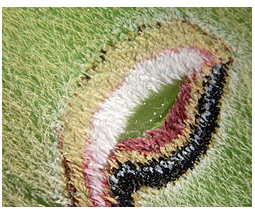
Is on each wing, a colored mystery sheds
No logic, meaning, or direction for
Our minds. We do not need to ask for more.
The Luxury of Peace
Modern poetry modern verse contemporary poetry contemporary verse modern poem contemporary poem
Modern poetry modern verse contemporary poetry contemporary verse modern poem contemporary poem
Long centuries before the growth of hate
With Rome’s warmongering, the Greeks emerged
With games of dithyrambs and sport, a spate
Of comedy and tragedy that purged.
The irony is tyrants helped to cause
This strange fresh crop. The fortunes that they blew
Required remodeled dreaming and new laws.
When naked athlete, tensed and straining, threw
His javelin, he became a star
More wonderful than murderers called kings
And generals, if, that is, he threw it far
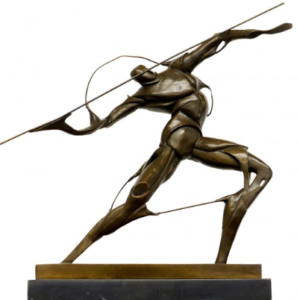
https://www.art-bronze-sculptures.com/408/futurism-bronze-figure-warrior-with-spear-signed-u.-boccioni
Enough. It seemed humanity grew wings.
..The soaring poet and musician took
….The prize, not soldiers. Our old world shook.
The Night before Thermopylae—
“The Hot Gates”
“Phaedrus’s praise for erôs (love) as a precondition for courage employs poetic quotations from poems that in fact state that wisdom is the true precondition, and that erotic passion without thoughtfulness leads to disaster.” ~ http://ndpr.nd.edu/news/plato-and-the-poets/
The backbone of a man needs love. Without
That it becomes a wounded reed, a limb
That hangs loose from the trunk, however stout
The oak might be. Devotion gives to him
A living sturdiness that is not blown
About by breezes or by tempests sent
By chance. A warrior does not need a throne
For courage. Soldiers lie inside their tent
Together in the dawn before the fight
That threatens lovers’ Spartan blood with death.
They breathe together in the calm of night
And when the war comes, shout with single breath.
..If both must die in glory, still they know
..Their love will fire the centuries with its glow.
The Poet!
“light, winged, holy creature”
~ The words of Socrates to describe a poet, as quoted in
Penelope Murray, Plato on Poetry, 8
That’s always how I’ve thought about myself,
Yup, yes, of course, at least when I have thought
Of me as “poet”—surely more than just an elf
With little, cutesy wings. In fact, a lot
More serious is what I am, more like
A diademed archangel. Yes! I know
The truth about me as a poet. Hike
Me up to higher realms and make me glow
If you’re describing me, the rhymester. Don’t
Just think of me as someone who churns out
Those screeds of sonnets, though that is my wont,
But praise me as angel or I’ll pout.
..I’m nearly holy, Phillip poet me.
….Bow down before in my high degree.
The Poetic Kind of True
Modern poetry modern verse contemporary poetry contemporary verse modern poem contemporary poem
“The stories begin in kinds of truth. As events recede in time,
they grow not smaller but larger in language. The ancestor who
fought locally becomes a hero in a battle which assumes
the scale of the epic.” ~ Michael Schmidt, The First Poets, 9
Modern poetry modern verse contemporary poetry contemporary verse modern poem contemporary poem
The poet makes life truer, makes it large
As it is meant to be. The poet makes
Our history higher. This provides the charge
That it deserves. The Everest language shakes
The past as if volcanic, lava’s spew
Writ hotter in an earthquake realm of love
Or war. The poet’s panoramic view
Is like the three dimensional above
The landscape of the long ago. The lens
Is clearer, or at least it seems to be.
Its focus peels away the small to cleanse
Or shows the small with male intensity.
The epic eyes of poetry are blue,

As vast as Greek skies, truer than the true.
The Sacred Fire
Modern poetry modern verse contemporary poetry contemporary verse modern poem contemporary poem
The Thespians of Greece in ancient times
Upheld the god of love, devout as saints
Have ever been. Deep lovers’ paradigms
Are never quite as true as perfect paints:
Vermeer’s silk velvet spaces spring to mind.
The purity those Thespians conceived
For love is cleaner than the poet, blind

And holy in lost time, is now perceived,
Though he is idolized in throbbing lines
And storied power. Those worshippers above
All else endorsed the ideal truth. Her shrines
Aroused the thuribles of incensed love.
All other gods and goddesses must bow
To love’s high crown on love’s broad brow.
The Silliness of Men
“He ran naked to the supposed site of Achilles’ tomb at Troy, while his male lover, Hephaestion, crowned the tomb of Achilles’ beloved Patroclus.”
~ Robin Lane Fox, The Classical World: an Epic History from Homer to Hadrian
Forget about the evils men have done.
They’re far too awful and depressing, yes?
Instead let’s have a little bit more fun
By thinking of the sappiness and mess
That is the mind of masculinity.
The son of Philip ran around a tomb
Supposedly in the vicinity
Of Homer’s hero. No one with a womb
Would do a thing as daft as that. The man
He loved from adolescence, his boyfriend
Until death ended all that, also ran
To crown Patroclus’s grave. That toy friend,
This Hephaestion, he was just as mad.
But then it’s better to be mad than bad.
The Tortoise
Modern poetry modern verse contemporary poetry contemporary verse modern poem contemporary poem
“Other poems by Apollinaire relate to Orpheus, for example, ‘The Tortoise,’ whose shell—a gift from Apollo—provided the frame of his lyre.” ~ Michael Schmidt, The First Poets, 23

The tortoise might be thought of as a thing
For poetry by Hughes, his awful “Pike”
And so on. Tortoises don’t make us sing
That often. Ancient ugliness, they’re like
Revolting dinosauric beasts of old
With metal skin, almost, and blankest face.
They drag and scrabble on the land. They’re mould
From pre-historic times. They have a trace
Of hope built in since they’ve survived so long,
But that is it. And yet Apollo gave
A tortoise shell to Orpheus. The song
Of poetry, the sweetest and the grave,
Has made the tortoise holy in its grim
Repulsiveness. It gave the first great hymn.
The Triune Potency
According to Penelope Murray, “Socrates . . . . says, ‘any story or poem . . . narrates things past, present or future’ ”. ~ Plato on Poetry, 4
We want a poem that is full of now,
And past, and future, full. We want intense
Severity of teeth. We want to bow
Gazelle-like to the leopard’s front fangs, dense
With meaning and with ambiguity.
The present all alone is not enough.
We want an urge to promiscuity
With what is past and future, rape as rough
As words can manage. Settling for the past
When we could have tomorrow and today
Involved in the assault would not be vast
Enough to meet our needs. The lines must slay.
We want it all in perfect poetry,
Our history, present, and eternity.
A New Heaven and Undirtied Earth
For James Reis
Forget the “thought” of Plato (Socrates)
That stories, plays, and poetry can cope
With only pasts, and now, and futures. Seize
The truth instead. Create a newer scope
By setting works in time that’s never been,
That isn’t present, and will never be.
Create your verse in periods that are clean,
Not sullied by such days. Beside a sea
Imagined by a mind that does not need
Mere yesterdays, tomorrows, or such facts,
This literature can plant its untried seed
To make a universe with dreamed up acts,
Acts made in unknown moments, in a place
Not found yet, springing in a poet’s space.
The Truth about Ancient History, Plato, and Poetry
“Socrates says in the Republic that he and Plato’s brothers might have to inform poetry about the ancient quarrel between it and philosophy. Glenn Most (“What Ancient Quarrel between Philosophy and Poetry?”) argues that Plato most likely invented this quarrel. Anyway, we do not see any evidence of it before him. Xenophanes, a philosopher famous for critiquing Homeric and Hesiodic theology, himself wrote poetry, and seems to have been contesting the truth of the epic world-views, not its mode of presentation. Heraclitus criticized everybody who deemed himself wise, Pythagoras and Hecataeus as much as Hesiod and Archilochus. Archaic poetry appears not to mark out philosophers for criticism. (In fact, ‘philosophy’ words are not extant in poetry until Aristophanes’ Ecclesiasuzae of 391, and even there not derisively). Comedians writing during Plato’s life depicted characters ridiculing intellectuals, but this hardly counts as an ‘ancient quarrel,’ and certainly not one between ‘poetry’ and ‘philosophy’.” See http://ndpr.nd.edu/news/plato-and-the-poets/
The ancient war around the strictest thought
(Philosophy and logic) and between
The poets was created by the “ought”
In Plato’s brain. His rules, a bit too keen
As Nazi thinking often is, occurred
To him and him alone. He pretended
This war stretched backward. In this way he slurred
The poets. Plato’s war has not ended.
It still goes forward in some thoughtless minds
Like his. His backward thinking was intense.
Creating facts which were not facts with blinds
He put up, Plato wasn’t worth two cents
About pure poetry. His mental act
Ignored the truth of history and fact.
The Truth
The ancient Greeks are there. They do not hide
The truth about themselves like holy priests
Of papal Rome. The Greeks adored male pride
And loathed it. They were not pure logic’s beasts:
They gloried in their contradictions, found
Them not the least distressing. If a man
Became a traitor or could drag around
Another warrior there behind hate’s van,
The ancients loved him for his evil—or
His greatness just so long as it was grown
In masculinity. The man could whore
Around. What mattered was testosterone.
..A man could be straightforward or be sly.
….His triumph was the point, through truth or lie.
The Venerable, Ancient Need
Modern poetry modern verse contemporary poetry contemporary verse modern poem contemporary poem
“And Socrates the philosopher, who despised everything, was, for all that,
subdued by the beauty of Alcibiades; as also was the venerable Aristotle
by the beauty of his pupil Phaselites [Palaephatus of Abydus].” ~ Athenaeus, Deipnosophistae, XIII, 906

The never changing needs are with us. They
Brood, like the beauty of a petrified
Tree’s wood. Both are colorful and hard. They stay
Destruction’s hand. Unending need is wide
Like our imagination of the seas
Of myth, Aegean, Adriatic skies,
And Attic sweetness like the Sirens’ pleas
That would have drowned a hero more unwise.
Some needs cannot be banished. They are strong
Against the will of iron minded men
And longer than millennia are long.
Needs lurk within the heart’s most sacred den.
Philosophers pretend. The saints deny.
Some needs are beautiful. They do not die.
The Voice
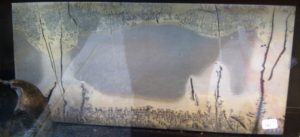
1 Kings 19:11-12 And he said, Go forth, and stand upon the mount before the LORD. And, behold, the LORD passed by, and a great and strong wind rent the mountains, and brake in pieces the rocks before the LORD; but the LORD was not in the wind: and after the wind an earthquake; but the LORD was not in the earthquake: And after the earthquake a fire; but the LORD was not in the fire: and after the fire a still small voice.
2 And the angel of the Lord appeared unto him in a flame of fire out of the midst of a bush: and he looked, and, behold, the bush burned with fire, and the bush was not consumed.
3 And Moses said, I will now turn aside, and see this great sight, why the bush is not burnt.
4 And when the Lord saw that he turned aside to see, God called unto him out of the midst of the bush, and said, Moses, Moses. And he said, Here am I.
5 And he said, Draw not nigh hither: put off thy shoes from off thy feet, for the place whereon thou standest is holy ground.
6 Moreover he said, I am the God of thy father, the God of Abraham, the God of Isaac, and the God of Jacob. And Moses hid his face; for he was afraid to look upon God. ~Exodus 3: 2-6
We all are fearing that that voice will speak,
But how will it be spoken? Will we hear
It when it whispers in an ancient Greek
Severity of stone hard Doric fear?
Perhaps a still, small hoarseness in a fire
Will echo in the deserts of our soul
When grief has overtaken us entire.
Perhaps a lotus blossom is the scroll
Containing silence greater than the Word,
A nothingness assuring us of peace
No syllables could give. A dream of blurred
Divinity might stutter and then cease.
..A wheezing seer gurgles in a drawl,
….“Perhaps there is no speaker after all.”
They Loved Sovereignty and Liberty Most
“And the Lacedæmonians offer sacrifices to Love before they go to battle, thinking that safety and victory depend on the friendship and those who stand side by side in the battle array. And the Cretans, in their line of battle, adorn the handsomest of their citizens, and employ them to offer sacrifices to Love on behalf of the state, as Sosicrates relates. And the regiment among the Thebans which is called the Sacred Band, is wholly composed of mutual lovers, indicating the majesty of the God, these men prefer a glorious death to a shameful and discreditable life. But the Samians (as Erxias says, in his History of Colophon), having consecrated a gymnasium to Love, called the festival which was instituted in his honour the Eleutheria, or Feast of Liberty; and it was owing to this God, too, that they Athenians obtained their freedom.” ~ Athenaeus, Deipnosophistae
Greeks knew that rapt successes are the best,
Whether they are triumphs of the mind or
The triumphs of the body. In the quest
For total victory Greeks knew that war
Was utmost. The Olympics worshipped this
The clearest doctrine of their ways. To wear
The laurel crown there on that field was bliss.
To win a prize was greater than a prayer,
No matter if the laurels were for ode
Or tragedy. The losers slunk away
But champions invoked the highest code,
Respect, loud as Bucephalus’s bray.
..Most royal of the gods is Nike. Keen
….Victory is king and freedom his queen.
Three Thousand Years before Apple and Three Thousand Years after the iPad
I carry in my knapsack poems by
The ancient Greeks, the eldest ones, the best,
The best of elders. They are still as spry
As dolphins’ arcs by the Argosy’s quest.
Lines wait within the safety of the book,
Alive and lively now as ever, like
https://en.wikipedia.org/wiki/Resurrection_plant
A resurrection plant. They undertook
Divinity when quilling down each spike
Of brilliance in their lines. But crammed in with
That poetry I carry modern things,
Phone chargers and an iPad. There’s no myth
To go with them. They don’t have singing wings.
..Nope, iPads, gone millennia from now,
….Will be nothing. They aren’t the Golden Bough.
[This sonnet was first published March 9, 2019. It was illustrated there: https://classicalpoets.org/2019/03/09/three-thousands-years-by-phillip-whidden/]
Thucydides:
Modern poetry modern verse contemporary poetry contemporary verse modern poem contemporary poem
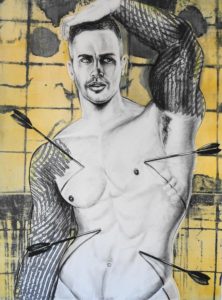
“Because of the Human Thing”
We forecast both the worst and best because
The human thing is settled in the crux.
Set there like sapphires made to master laws,
This thing assures the rigid rule of flux
Or many faceted uncertainty.

This gemstone is the single perfect shape.
It offers only one uncertainty—
That fixed capriciousness, the living rape
Of would be diamond-pure deep control.
Just as the solitary fact is change,
Its fractals cannot take the arctic pole
Star as their source. White certitude is strange.
Fate assigned Alcibiades his place,
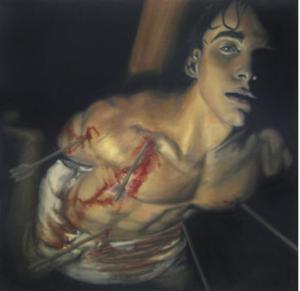
Uncertainty, disloyalty, disgrace.
To the King of Greece
The past attempts to speak. It tries to talk
With words and other ruined things like stones
That lie in heaps or carved acanthus stalk
Of leaves in marble. Sometimes vellum tones
Come up from opened scrolls. Occasionally
Our history gives a golden squawk, as when
“The face of Agamemnon” tries to see
Us through its sealed up eyes, we modern men
Who’ll rot beneath the satin lids of coffins, not
With heavy metal masks to hide our truths.
Besides, who’ll come to look for you, a jot
Or tittle to antiquarian sleuths?
..No Schliemann hovers in the future’s skies
….For sending telegrams about our eyes.
Troy in New Orleans, Manhattan, or London
Modern poetry modern verse contemporary poetry contemporary verse modern poem contemporary poem
So I found “Helen” sitting in a streetcar; the Dionysian revels of her court were transferred to a Metropolitan roof garden with a jazz orchestra;and the katharsis of the fall of Troy I saw approximated in the recent World War. ~ Hart Crane, “General Aims and Theories”
See Helen swaying in a streetcar, or



Perhaps far better, Paris, or the arm,

Or thigh swells of Achilles. That is for
A poet like Hart Crane who sees no harm


In lusting after harder, mythic males


On buses. Modern poets must retrace
The ancient Greek tale of a thousand sails

With what we see in a watering place
On Bourbon Street or in the Bronx. The war

Goes on just south of Troy in Palestine
Millennia later so why not more
Voluptuousness. Find it in a shrine
Made up of carriages of Tube trains on

The Central Line or in a gay bar’s brawn.

True Love
For Charles Randall Stanfield
Modern poetry modern verse contemporary poetry contemporary verse modern poem contemporary poem
“I can never feel certain of any
truth but from a clear perception
of its Beauty.” ~ John Keats
True love is the appreciation of
True beauty like a perfect idea,
Ideals transparent as jewels above
A crown of crystal worn by Sophia
In realms of pale mosaics in a dome,

20 Apr 1983, New Zealand — Princess Diana lost in her thoughts at a dinner banquet. — Image by © Tim Graham/CORBIS
Or resonances of purity

Prince Charles and Lady Diana Spencer are shown on their wedding day at St. Paul’s Cathedral in London on July 29, 1981. (AP Photo)
Like higher mathematics; thus the gnome

Called Plato says. He wanted surety.
More human looms the notion of Descartes
Who says that love is of the soul when joined
In willingness of feeling with a part
Inside us that is built of splendour groined.
Ortega y Gasset in his book On
Love says — Or, yes, when weight and flux meet dawn.

computer generated pattern that resembles lines of magnetic flux of solar flares
Twingeing
Faint Orpheus is made of firefly light
And phosphorescent footprints in the sand
Inside Aegean coves of curving white.
He fades and shines like constellations spanned
With stars and planets hidden often by
The clouds of time. He goes and comes back pale
Like tingling tides of foam on waves that try
To wash the coves a whiter white. Like hail
He hurts the heart, but then the pangs are gone.
Scarred Orpheus is like a moon that wanes
While reigning. He appears and then is drawn
Back like a veil made up of rites and pains,
More like a dying moth but one who goes
To chrysalis and comes again in glows.
Two Men in Love in Death
Modern poetry modern verse contemporary poetry contemporary verse modern poem contemporary poem
“Hector dies, and when at last in Book XXIV his corpse is recovered, it is laid out and Andromache holds Hector’s head in her lap, as Achilles had held Patroclus’.” ~ Michael Schmidt, The First Poets, 112
Achilles cradles his Patroclus’ head
In highest, deepest love and deepest death.
The hero thought he loved him in his bed,
His hero’s hardness hunched with gasping breath,
But how he loved him, just how much he knew
That, had escaped him, well beyond his heart,
Until he held that precious hair and drew
Those sacred curls between his fingers, tart
With grief. When Hector’s body was retrieved,
His wife found only love, a cuddled love
There in her lap, well hatred as she grieved,
Her hatred giving scabs and blood a shove
Away from hair. Her hate and love were one.
She dared not dwell upon their unharmed son.
Ugly Beauty
Modern poetry modern verse contemporary poetry contemporary verse modern poem contemporary poem
You might want to read this sarcastic version of the Greek myth http://www.shmoop.com/echo-narcissus/summary.html
before you read the sonnet.
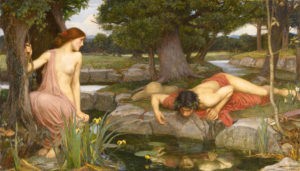
The music comes from speakers. Radio
3 broadcasts strains and sounds. They’re more like stains
Inside the ear and in the air. They flow
Across the kitchen and they’re more like pains
Especially because they’re meant to be
About Narcissus and about the pink
Pale Echo. It is a cacophony
Of notes and bangs, a perfume like a stink
Of noises. It’s true… the ancient myth
Is ugly too, made up of beauty smeared
With agonies. It is a monolith
Of cruelty and loveliness revered
As only youth can suffer it. The young
Man, nymph and chords are like a tortured tongue.
Upon the Face of Agamemnon
“and also he [King Priam of Troy] admires Agamemnon for his beauty”
~ Athenaeus, Deipnosophistae, XIII, 906
Forget that Helen for a moment. Think
Of gorgeous men. The King of Troy could not
Resist men’s beauty. Helen caused a stink
That lasted years and years and it was fraught
With Troy’s death—but don’t forget the king
Of Mycenae. Old Priam’s eyes fixed on
The royal one of Argos. Homer had him sing
The wonders of his beauty. His height, brawn
And other qualities exalted him
Above the other royal heroes. Some
Stood taller and they might be strong of limb,
But he was of the lot the royal sum.
..Commanding grandeur of the heights, his face
….Gave Agamemnon’s beauty god-like place.
Watered Down Wine and Esthetics
“Gretchen Reydams-Shils (“Myth and Poetry in the Timaeus“) deals with Socrates’ puzzling remark that his description of an ideal state was like a painting.” ~ http://ndpr.nd.edu/news/plato-and-the-poets/
Socrates’ description of the ideal
State being like a painting makes us laugh.
It’s like a macho soldier with a squeal-
Like giggle, or an extra tall giraffe
That disapproves of using long, long necks
For grazing in the upper regions of
The trees across the veldt. Things complex
As strict philosophy, esthetics, love,
And all the stuff great thinkers try to cope
With tempt the Platos of this world to use
Mimesis, so it seems. That makes a dope
Of him. Perhaps he had too much of watered booze
The night before. That’s all. If he had thought,
He might have been more careful how he taught.
Were I to Believe in Angels’ Songs
If angels, each one, had a message they
Would sing to us, would each charge be the same,
A Kyrie, an Adoramus te,
Or Gloria? No, that would be too tame.
I’m thinking every one would be unique,
Each text and melody enough to slake
A different desert thirst. Homeric Greek
Combined with Mendelssohn-like flow would make
One part of us reverberate, that long
Symphonic sweep fulfilling our dry veins,
But then perhaps a shift to Hip Hop song
Would be required to serenade our stains.
This much I know. Each angel snowflake text
Would leave us feeling unfulfilled and vexed.
What We Drink
Who wants thick wisdom first in poems? It
Is ours for chewing in the pleasures of
The scrolls of Plato, thinkers who permit
The thought that pleasure proves the point of love,
And stern philosophers with guts to kill
All weakness, straight. The cup of hemlock comes
And they are strong. They drink. They do not spill.
The use of poetry with pretty thrums
On mandolins in minds and hairy chests
Is first for some, perhaps a very few.
Philosophy dwells. Poetry arrests.
It seizes arteries and gives their view.
..Just that is what we want from poets first.
….We want the slaking of the heart’s own thirst.
Where Cleanest Vaulting Beauty Flies
Modern poetry modern verse contemporary poetry contemporary verse modern poem contemporary poem
“Youths and maidens all blythe and full of glee, carried the
luscious fruit in plaited baskets; and with them there went a
boy who made sweet music with his lyre, and sang the
Linos- song with clear boyish voice.”
~ Samuel Butler’s English version of The Iliad, Book XVIII)
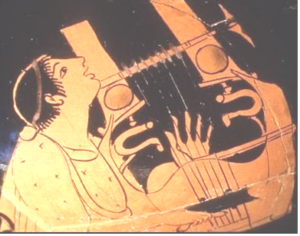
Before the voices in the English choirs
Of churches and cathedrals, there was sound
As pure as heaven’s see-through streets, then spires
Of Oxford singing, and its chapels crowned
Within by treble obligatos there
Above in fan-like carvings in white stone,
Just like the colored bosses in the air,
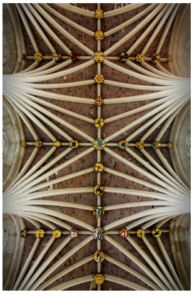
The air made lovely by that realm of tone,
The air made holy by that purity
Of melody above the other parts
Of lower, underpinned maturity.
Since ancient times this highness reached our hearts.
..The early Greeks and Anglicans each learned
….Where tallest sounding lovelinesses burned.
Presumption
Who teaches us what love is, what it means?
Who? No one. Many try, but none of them
Succeeds. Some say it’s like quick benzedrines
Without inhalers needed. Bethlehem
Is touted as another meaning of
This principle or feeling—whatever.
In this proposal Calvary is love,
The birth and death bound in one endeavor.
Philosophers trot out their thoughts and words
From Plato to the end of time and pop
Songs formulate love as tunes of trapped birds
Vibrating in want of a man on top.
..Some say that friend or brother love is best.
….Why teach us what we learned at mother’s breast?
Widescreen, 3D, Surround
Sound, Buttered Popcorn
and Icy Coca-Cola®
“It follows from the fact that poets do not have knowledge of that about which they speak, but aim to seem as though they do, and some listeners do not realize that poets lack knowledge.” ~ http://ndpr.nd.edu/news/plato-and-the-poets/
A poet writes a line that sends hot ice
Across the scalp. The reader does not care
About some fact obscured. She wants a slice
Of thrill. It’s like a movie made to scare
Us. Horror is the point. We want a taste
Of love, a titbit on the tongue. Is that
So bad that Plato’s thinking has to waste
Itself condemning it? He spits his splat
Of thoughtful mucus on our human need
For entertainment. Plato did not know
Of screens in multiplexes. His slow speed
Imagined just one cave with walls which glow
With palest light and shadows in the mix,
A vision that Sony Pictures® can fix.
With Straight Gold Bars

I sat beside my mother as the sale
Was made, the purchase of The World Book
Encyclopedia. I loved the pale
Cream, knobbled leatherette, the noble look
Of deep maroon square placed on spine of each
Restrained and heavy volume, glossy leaves
Of shining color visuals—the reach
Of all in classic beauty as the eaves
Of widened wonder. Suddenly at school
My fourth-grade teacher gave us each a myth
From ancient Greece to tell. We had the tool,
My mother and her little boy, so with
Me at her side we found Icarus who
Defied the gods and father— and who flew!
Beside the Thousand Ships
There once were times when men could hold large pride
In having sons who had as lovers men
That gods could hate and love — and take their side
In gut-strewn battle. Fathers nodded when
Their sons retired to tents and to the love
Of those divinely made, so beautiful
That poets would extol such strength above
The softnesses of women. Dutiful
To manly thighs that urge devotion to
A high-born hero, bed-mates in these times
Commanded soldiers’ reverence. These few
Like Patroklus produced loud tacit chimes
That caused the camp to shout a winked hurrah
Beyond a bride, cheers filled with manly awe.
Πιερία Pieria
Modern poetry modern verse contemporary poetry contemporary verse modern poem contemporary poem
Pieria was laid with plains and peaks,
The highest one Olympus, when the gods
Set forth the world. Poseidon’s seashore speaks

And gives Pieria glossed dolphin pods.
Olympus speaks still, too, if we revere
The gods or what they stand for when the best
Of them shine out across the sea. No fear
Of them exists now. Jesus has suppressed
Their goodness and frivolities. The ridge,
Pierius, was once the home of song
Since Muses built their artful nine-fold bridge
From it and Orpheus embattled wrong
From here, death’s wrong. He made this land the start
Of music, poetry, and god-like art.
